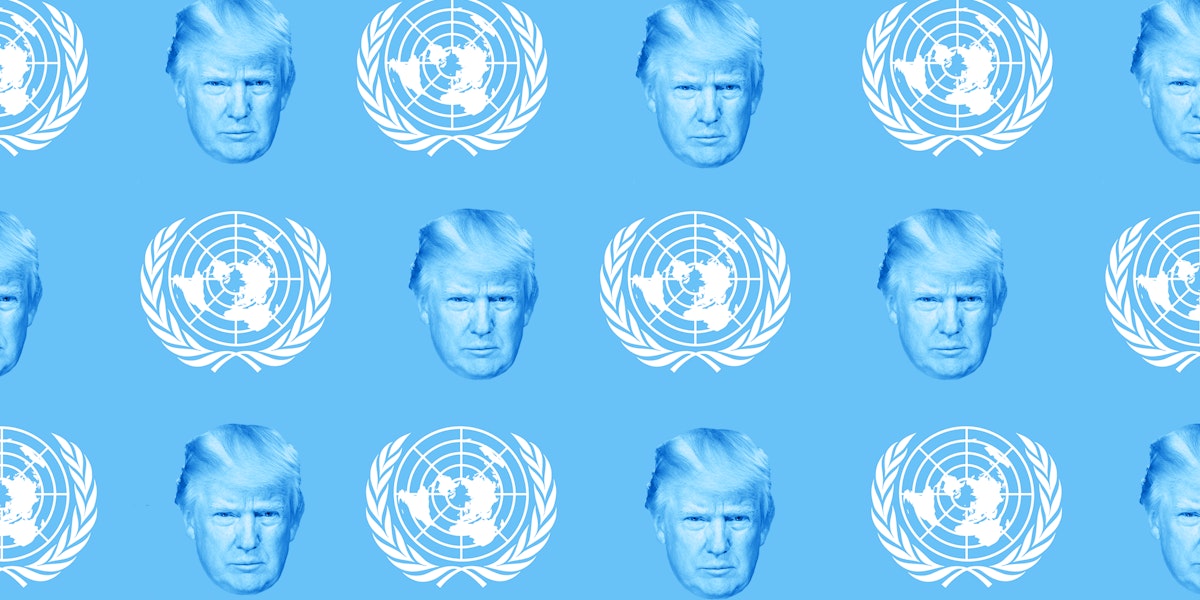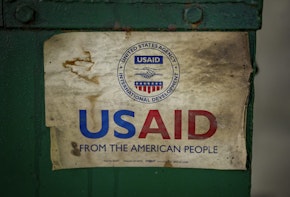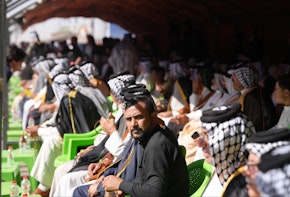What has Donald Trump done to the United Nations? In the run-up to his inauguration in January, the president threatened to wreak havoc on the organization. Angered by a December 2016 Security Council resolution criticizing Israeli settlement-building in the Occupied Territories, on which the Obama administration abstained, the president-elect darkly warned on Twitter that, “as to the U.N., things will be different after Jan. 20th.” During his turbulent tenure so far, Trump has veered from threatening major financial cuts on UN operations to using the Security Council as a centerpiece of his North Korea policy.
As to the U.N., things will be different after Jan. 20th.
— Donald J. Trump (@realDonaldTrump) December 23, 2016
The administration’s erratic approach to using and abusing the UN has demonstrated little coherent strategic logic. As in most policy areas, it is clear that opposing factions in the White House have nursed very different views of multilateral issues such as the Paris climate change agreement. And while the U.S. ambassador in New York, Nikki Haley, has won praise as one of the steadier hands and more internationalist voices on Trump’s team, her influence over the White House has oscillated markedly.
Meanwhile, the UN has a new secretary-general, António Guterres, who is bent on making the organization leaner and more efficient—and whose reform agenda unexpectedly overlaps with the president’s. There is a chance, though certainly no guarantee, that Guterres and Haley may be able to translate Trump’s anti-UN tirades into a constructive modernization agenda. With the president preparing to address the UN General Assembly for the first time this month, what is the future of the U.S.-UN relationship?
Trump’s Limited Impact at the UN So Far
It is hard to draw up a reckoning of the Trump administration’s engagement with the UN system to date. Yet three overarching points appear clear. The first is that the UN has proved far more resilient to American pressure than the incoming president may have expected. U.S. diplomatic offensives on issues ranging from the Paris deal to cutting the costs of blue helmet peacekeeping have sputtered out with surprisingly limited effects.
Second, Trump and his advisers have gradually come to see the value of the UN to U.S. interests, even if they are often still loathe to admit this. If the most dramatic example of this has been the administration’s embrace of Security Council diplomacy as a means to limiting the Korean crisis, the United States has acknowledged the organization’s utility in other trouble-spots.Having trumpeted potentially severe cuts to American contributions to UN aid agencies in its first month in office, for example, the administration has pledged almost $2 billion to efforts to stem the famines plaguing Nigeria, Somalia, South Sudan, and Yemen, although the U.S. system has been slow to get the money to the UN in some cases.1
Third, with each flawed foray against the UN, the Trump administration has ceded some of its influence in New York to other powers. In particular, there has been talk of the United States passing leadership on multilateral issues to China.2 This has sometimes been overblown, but Beijing now plays a lynchpin role on at least two issues—North Korea and climate diplomacy—that will be crucial to the UN’s credibility.
Reflecting the administration’s grudging but growing recognition of the UN’s significance, Trump will convene, on the eve of the General Assembly, a meeting with other leaders on reforming the organization that will focus on a remarkably technical set of issues.3 Rather than dwell on the supposed iniquities of globalism, the president will corral his foreign counterparts to declare their full support for Secretary-General Guterres, who has laid out a series of plans to streamline the organization’s bureaucracy since taking office in January. Whereas Trump has lambasted the UN in crude terms, Guterres has looked closely at the system’s inner workings, and sees a lot of room to trim the bureaucracy.
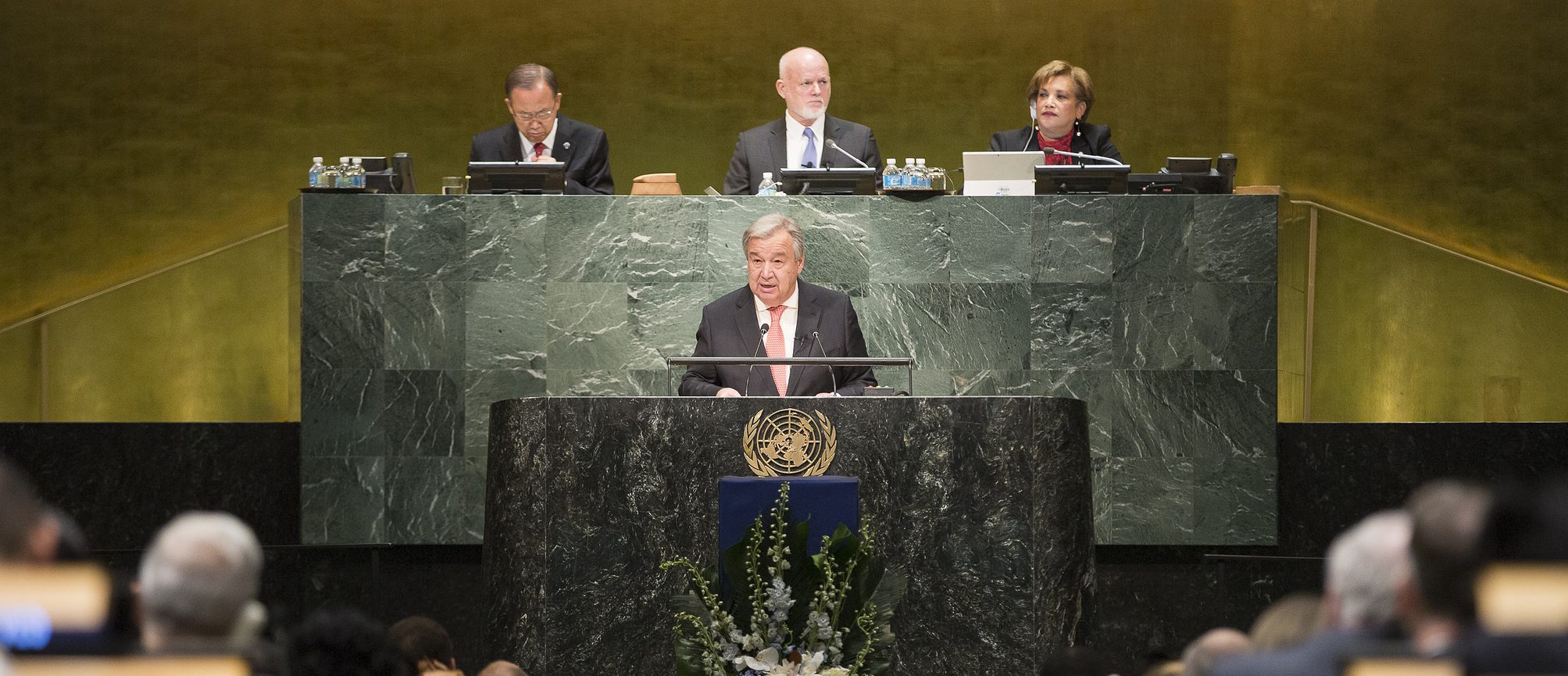
Guterres’s proposals are not uncontroversial. Some non-Western diplomats worry that the secretary-general is simply looking for ways to deliver cost savings for the United States and other big contributors to the UN budget. Yet the mere idea of Trump leading a session on topics such as the role of the United Nations in providing a platform for partnerships that would enable global sustainable development would have seemed quite ridiculous in January.
It is inadvisable to read too much into any announced Trump administration policy initiative. It is quite possible that the president will talk supportively about UN reform one day, only to fire off some tweets attacking it the next morning. There will be more battles over U.S. contributions to the UN budget. But amid the foreign policy chaos that characterizes the Trump era, it is at least possible that the administration is settling on a workable—or even mutually profitable—relationship with the UN. This would not be the first time that a highly assertive Republican administration has shifted to a more positive attitude to multilateralism in light of experience. Having fallen out with the Security Council and then-Secretary-General Kofi Annan over Iraq in 2003, President Bush and his advisers worked hard to rebuild ties in their final years in office.
Yet if there is a chance that the Trump administration will learn to live with, if not love, multilateralism, there is also a danger that it will end up in a diplomatic car crash in New York. If the Korean crisis escalates toward war, the Security Council may split decisively as it did over Iraq—with China and Russia refusing diplomatic support to Washington—doing profound damage to UN diplomacy. Trump and his advisers also still appear intent on finding ways to undermine the Iranian nuclear deal, which could similarly split the Security Council. Less dramatically but still corrosively, the administration has made a priority of protecting Israel against criticism at the UN, an issue on which other states will not compromise easily.
U.S.-UN relations thus still rest on an uneasy basis. The next three sections of this report ask (1) why the UN has proved resilient in the face of Trump to date; (2) whether Trump’s support for the Guterres reform agenda could unexpectedly have a positive impact on the UN system; and (3) how broader international tensions, above all the Korean crisis, could still throw U.S.-UN relations into a tailspin.
Trump’s Failed Offensives
While Donald Trump was frequently dismissive of the UN on the campaign trail in 2015 and 2016, he never developed a coherent plan to weaken multilateral diplomacy. His one firm pledge (in common with a number of his Republican opponents) was to pull the United States out of the Paris climate change agreement. More generically, he attacked the UN for eating up U.S. resources and criticizing Israel,4 but he devoted far less detailed criticism to the UN than to either NATO or America’s Asian alliances.
After his election, Trump reassured internationalists by picking the mainstream but inexperienced Nikki Haley to represent the United States in New York. Trump’s negative attitude to the UN only crystallized after the Security Council on December 23 passed a resolution—tacitly backed by the Obama administration—calling on Israel to halt building settlements in the Occupied Territories. Egged on by congressional Republicans calling for steps as severe as totally defunding the UN, Trump promised to target the organization upon entering the White House. Yet he still had no clear strategy for doing so, and he reassured Guterres that he still saw “great potential” in the UN in a phone call at the start of the new year.5
The early months of the Trump administration were a mix of calm and chaos on the UN front. While the White House leaked plans for notional cuts of 40 percent or more to UN budgets,6 Ambassador Haley quickly moved to reassure her main foreign counterparts that she was not a wrecker. On many issues, especially the peacekeeping operations that occupy much of the Security Council’s time, the U.S. mission to the UN stuck to pre-existing lines. Haley also made an early imprint on administration policy by taking a hard line with Russia over Ukraine and Syria in the Security Council, off-setting Trump’s softer approach to Moscow.7
Although Haley made some early attempts to keep the UN in line—such as clumsily nixing a proposal by Guterres to make former Palestinian premier Salam Fayyad his representative in Libya in February8—the real pressure began when the administration released its “skinny” budget confirming its intent to slash large amounts of funding to the UN in March. In the months that followed, the United States launched a series of diplomatic offensives on different parts of the UN system, albeit still without much sign of a clear strategy. The president announced his intention to withdraw from the Paris Accord at the beginning of June.9 Haley led a concerted push to cut $1 billion from the UN peacekeeping budget through the second quarter of the year.10 She also visited Geneva to warn the Human Rights Council that the United States would walk away from the body (which the Obama administration had cultivated as a space to talk about crises such as Syria and thematic issues such as LGBTQ rights) unless it took steps to block abusive governments from membership and devoted less of its energy to criticizing Israel.11
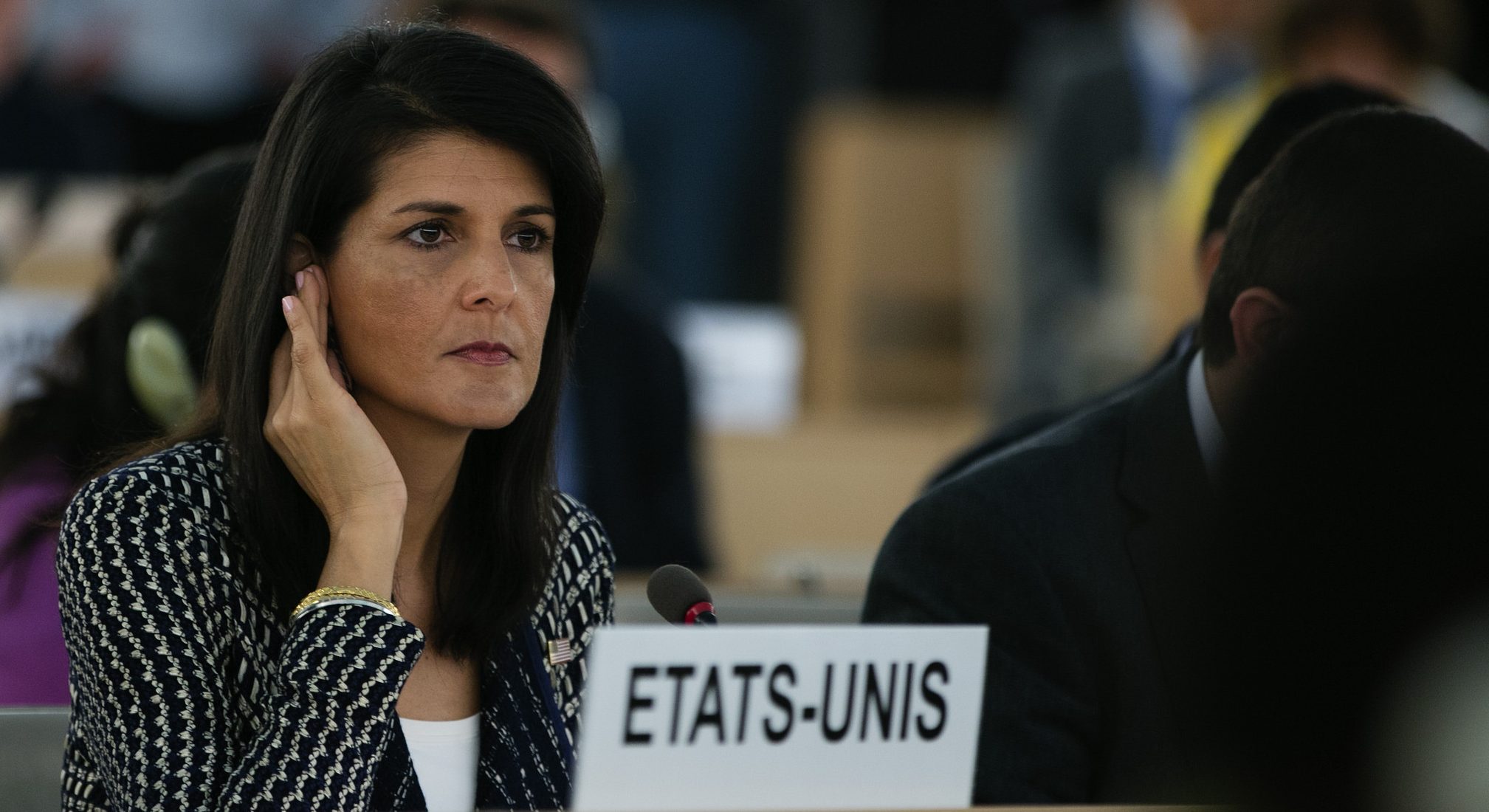
Yet the net results of these initiatives has been underwhelming. Trump’s announcement on the Paris Accords backfired as a host of U.S. businessmen, politicians, and civic leaders stepped up to announce their continued support for the treaty. While some observers had thought that major energy producers such as Saudi Arabia might follow the United States out of the agreement, none did so. Instead, Trump was ostentatiously isolated by the leaders of other major economies at the G20 summit in June on the issue.12 Visiting Paris in July, the president indicated some discomfort by hinting the United States could stay in the deal.
In New York, meanwhile, Haley found it harder to impose budget cuts on blue helmet operations than she had hoped. The ambassador’s advisers had initially favored strong-arm tactics—such as a threat to veto the renewal of the long-running UN Stabilization Mission in the Democratic Republic of Congo (MONUSCO) unless the Security Council agreed to major personnel cuts13—but other major powers pushed back with more detailed arguments about the costs and risks involved. European diplomats, with France playing a particularly prominent role, took a grip on the annual peacekeeping budget talks in May and June. The United States ultimately had to accept cost savings of $500 million rather than $1 billion, and even these were largely due to savings from blue helmet missions, such as in Haiti, that were already shrinking.14
The Trump administration’s bluntest efforts to assert itself at the UN seem to have the unintended effect of uniting other governments to defend the system.
This was only a one-year settlement, and Haley has repeatedly tussled with the French over peacekeeping issues in the Security Council. Yet diplomatic observers in New York infer that the ambassador, who has political ambitions reaching far beyond the UN, does not wish to be associated with any financial cuts to UN missions that would put large numbers of lives at risk. While the United States continues to press for changes in the Human Rights Council, and may succeed in persuading more democracies to run for seats there, the Trump administration’s bluntest efforts to assert itself at the UN seem to have the unintended effect of uniting other governments to defend the system.
Donald Trump, UN Reformer?
If Trump and Haley cannot bludgeon the UN system into submission, could the United States work with it to improve its performance and save money? There are reasons to think that this notion, which could only seem outlandish at the start of the Trump era, might just work. While Trump has spent 2017 attacking the UN from the outside, Secretary-General Guterres has been quietly liaising with Haley on how to fix it from within.
Trump and Guterres make unlikely political bedfellows. Guterres, a former Portuguese prime minister and UN High Commissioner for Refugees, is a lifelong socialist and intellectual with a penchant for quoting obscure European philosophers. But he has been almost as critical of the organization he now manages as Trump has been. Both before and since taking office, he has portrayed the UN system as bloated and poorly designed to address current humanitarian crises, wars and development challenges.
Almost every new UN chief starts the job talking about the need for reform. As early as 1953, the second secretary-general Dag Hammarskjöld was worried that the organization’s secretariat was growing too large. Guterres’ immediate predecessor, Ban Ki-moon, regularly grumbled that the system was not responsive to his demands. But Guterres now faces an especially severe set of organizational challenges.
Humanitarian agencies, which Guterres described as “broke and failing” in 2015,15 are struggling to assist record numbers of displaced persons and refugees worldwide. The UN calculates that it needs over $23 billion to cover its humanitarian operations in 2017, a record.16 Blue helmet peace operations in conflict zones such as South Sudan and Mali lack the political heft and military strength to ensure stability. The UN development system, once the strongest part of the institution, has become increasingly irrelevant.
In recent months, Guterres has rolled out a series of reform proposals with a common emphasis on simplifying the UN bureaucracy and letting it focus on solving urgent problems—such as preventing emerging conflicts—more flexibly than it can today. Major features of his reform agenda include:
- streamlining the UN development system by shrinking the number of UN offices—of which there are around 1,400 worldwide—and creating clearer lines of accountability to New York;17
- shaking up UN management systems, which currently prioritize process over results, to give UN officials and peacekeepers on the ground greater leeway to act creatively; and
- reorganizing the political and peacekeeping departments at UN headquarters to improve planning and oversight for peace operations and mediators.18
Although the details of these reforms are complex, Guterres insists that they will all help sharpen focus on delivering services to the vulnerable in poor countries and war zones by cutting back bureaucracy. Perhaps not coincidentally, they will also strengthen his own office’s ability to direct events on the ground.
Guterres is also open about the fact that he believes that the UN should aim to cut back its operational activities in cases where it has little chance of success. He is particularly skeptical of the value of large, open-ended UN peacekeeping operations such as MONUSCO, and has signaled that he would prefer the African Union to take on more military stabilization duties on the continent in future. In this, his thinking has paralleled that of Haley, who has questioned the value of keeping large numbers of blue helmets in countries such as the Congo and South Sudan, where repressive governments view the UN as a foe.
Many UN officials fear that Guterres, who has sometimes seemed aloof from his staff, also intends to curry favor with the Trump administration by cutting personnel in the name of reform. Representatives of developing countries, which remain a powerful bloc in New York, worry that the secretary-general’s plans to strengthen his control over the UN system would reduce their own influence over the institution.
It is not fair to say that Guterres is simply looking for ways to satisfy Trump. He had talked about the need to revitalize the organization extensively before becoming secretary-general,19 and probably planned to work on overhauling it with a sympathetic Clinton administration. Nonetheless, he has inevitably been cognizant of the need to work with Trump as best he can. In addition to looking for ways to streamline the UN system, he has been unusually outspoken in defense of Israel for a secretary-general. But while he has been critical of some of the Trump administration’s most egregious domestic legislation such as its Muslim travel ban, he has left other UN officials, such as High Commissioner for Human Rights Zeid bin Ra’ad, to deliver the strongest messages.20 (Guterres has in fact been quiet on human rights issues much more generally21 and seems to believe that hectoring governments over their records is counter-productive.)
Guterres dropped his guard around Trump’s decision to withdraw from the Paris agreement, warning that that the United States risked creating a geostrategic vacuum22 that other powers (implicitly China) would fill. But while the secretary-general has carefully courted Beijing, praising its contributions to international development, he underlined that he hoped the United States would not disengage from the international system.
Guterres has focused on building a personal relationship with Haley to offset the Trump administration’s initial hostility.
In the meantime, diplomats and UN officials confirm that Guterres has focused on building a personal relationship with Haley to offset the Trump administration’s initial hostility. His public overtures to the ambassador have ranged from giving a university commencement speech in her home state of South Carolina in May to joining her for a round of congressional meetings to discuss the UN budget in June.
This courtship seems to have paid off. Haley has given increasingly forceful support to his emerging reform agenda. This includes laying the groundwork for this month’s leaders’ meeting with Trump, which will endorse a political statement (negotiated with a like-minded group of states such as Britain) that will “declare our confidence in the UN Secretary-General’s reform initiatives and encourage him to lead organizational reform.”23The Guterres agenda and the reconceived Trump agenda for the UN appear to be converging.
This does not mean that Guterres and Trump will get everything they want. The mere fact that the secretary-general’s reform proposals have such overt U.S. backing is liable to make a lot of other countries more suspicious of them. Kacie Candela, a journalist who has followed planning for Trump’s reform meeting especially closely, warns that many non-Western diplomats are unhappy24 that they were not consulted well in advance. Russian commentators, wary of a U.S. power grab, have thrown a good deal of shade at the entire enterprise.25
And while Trump and Haley may approve of the general direction of the Guterres agenda, Washington and its allies may quibble with some decisive details. The secretary-general would, for example, like big financial donors to place fewer conditions on how their money is used by UN agencies and commit to predictable, multi-year funding rather than dole out cash on a case-by-case basis. Neither the United States nor other big funders are minded to give up their leverage over the UN this way.
Nonetheless, Guterres and Haley seem to have hit upon a strategy for containing and channeling Trump’s anti-multilateral tendencies into something like a coherent plan for UN reform. If the plan comes together, it could offer a pathway to gradually rationalizing the UN’s portfolio of aid, security, and development activities without causing the major disruptions that Trump originally threatened to impose.
In the medium term, a more efficient UN could also still be an asset for the Trump administration in dealing with many of the knotty issues on its agenda. The Iraqi government and U.S. forces have already relied heavily on UN humanitarian workers in getting aid to Mosul, and the organization is likely to have a long-term (if politically tortuous) role in the reconstruction of Syria. The president has insisted that he does not want America to get involved in “nation building” again.26 The UN may have to pick up the slack.
It would be ironic if Trump, the ostensible bane of the UN system, turns out be a catalyst for its constructive reform. But even if the president is edging toward rapprochement with the UN, there is a high likelihood that international crises and tensions will ultimately throw U.S.–UN relations into disarray.
Troubles Ahead
There are still multiple potential causes for new tensions between the UN and the Trump administration. The UN’s treatment of Israel is likely to be a constant source of friction, despite Secretary-General Guterres’s efforts to build better relations with Tel Aviv. Having threatened to boycott the Human Rights Council if it does not cut back its criticism of Israel,27 the United States may find it necessary to carry through its threat if non-Western states refuse to deal. This would curtail American influence over UN talk in Geneva, most likely meaning that the Human Rights Council would become more rather than less negative toward Israel. But if this would be an irritant, it would not necessarily have a major impact on America’s standing in the Security Council and UN headquarters in New York, which often pays little attention to Geneva.
The real dangers to U.S.–UN relations lie in Iran and North Korea. The Trump administration appears intent on finding reasons to unpick the Iranian nuclear deal, which the Security Council endorsed in a resolution in 2015. Haley has been active on this front, calling on the Security Council to spend more time talking about Iranian activities in the Middle East and visiting the International Atomic Energy Agency to quiz officials about Tehran’s fulfilment of its nuclear commitments.28 To date, the ambassador has not managed to hunt down any evidence that Iran is not fulfilling its promises, but has claimed that President Trump has grounds to accuse Iran of noncompliance.29 If Washington continues to pursue the issue, the Security Council could become bogged down in long debates over the agreement, pitting the United States against China and Russia and perhaps even its European allies on how to deal with Iran.
Whereas the Obama administration focused a large amount of time in the Security Council on Syria and African issues, Korea has leapfrogged these to become the defining crisis for the organization for the foreseeable future.
Nonetheless, there is an even more immediate risk that the Security Council will divide over how to deal with North Korea,30 pitching Washington against Beijing. China and the United States have long tried to maintain a common front over North Korea’s nuclear and missile programs at the Security Council, even if there have been doubts about Beijing’s implementation of UN sanctions, but Pyongyang’s surge in missile tests and nuclear threats in the first half of 2017 hugely raised the diplomatic stakes. Whereas the Obama administration focused a large amount of time in the Security Council on Syria and African issues, Korea has leapfrogged these to become the defining crisis for the organization for the foreseeable future.
The administration pulled off a genuine diplomatic success in early August when it persuaded China and the rest of the Council to sign on to a resolution imposing a new set of sanctions against North Korea, calculated to cut off $1 billion in foreign earnings. The president distracted from this with unscripted comments about visiting “fire and fury” on Pyongyang shortly afterwards. It was nonetheless striking that an administration that entered office bad-mouthing the UN now turned to it for support on the single greatest international security threat that it faces. In doing so, the United States also flagged its dependence on China to find a peaceful solution to the Korean situation in the absence of other options.
Military solutions are now fully in place,locked and loaded,should North Korea act unwisely. Hopefully Kim Jong Un will find another path!
— Donald J. Trump (@realDonaldTrump) August 11, 2017
Simply put, the UN’s future credibility as a mechanism to regulate international peace and security now primarily rests on its ability (or inability) to help guide the situation over North Korea away from constant crisis and potential military conflict. This in turn rests on China’s capacity and will to enforce the Security Council’s decisions. While the Trump administration has done well to persuade Beijing to play this role, the Korean crisis has essentially affirmed China’s position as a crucial player in UN affairs. But it is not clear that Beijing, although disturbed by Pyongyang’s actions, will continue to cooperate with the United States indefinitely. Washington called for even more stringent sanctions on Pyongyang after its September nuclear test, but had to settle for a weaker although still significant package to keep Chinese support.
If the United States appears on course for war with North Korea, China, Russia, and a significant number of other Security Council members are unlikely to back it. A big power crisis could very rapidly undercut the U.S.–UN rapprochement that Guterres has attempted to engineer with Haley. While Guterres has offered to mediate in the Korean situation, he has little if any leverage over the crisis. If the Security Council breaks down over North Korea or Iran, President Trump would be unlikely to invest any more time or capital in the minutiae of UN reform.
President Trump’s early attempts to undermine the UN may have been haphazard and unsuccessful. There may be a window for him to make an unexpectedly productive contribution to making the UN a little more effective. But the UN and perhaps even the president are at the mercy of events: the future of international cooperation may now be shaped by decisions in Pyongyang and Beijing, not New York.
Notes
- Andrea Shalal, “At G20 summit, Trump pledges $639 million in aid to four countries,” Reuters, July 8, 2017, https://www.reuters.com/article/us-g20-germany-famine/at-g20-summit-trump-pledges-639-million-in-aid-to-four-countries-idUSKBN19T0LC.
- Richard Gowan, “The U.N. Is Giving up on Trump The United Nations is losing hope that it can influence President Trump—and is threatening to activate Plan B instead,” Politico, June 27, 2017, www.politico.com/magazine/story/2017/06/27/united-nations-donald-trump-antonio-guterres-china-215315.
- Michelle Nichols, “Trump to host Sept. 18 meeting of world leaders on U.N. reform,” Reuters, September 1, 2017, https://www.reuters.com/article/us-un-reform-trump/trump-to-host-sept-18-meeting-of-world-leaders-on-u-n-reform-idUSKCN1BC5SP.
- Sarah Begley, “Read Donald Trump’s Speech to AIPAC,” TIME, March 21, 2016, https://www.time.com/4267058/donald-trump-aipac-speech-transcript/.
- Michelle Nichols, “After disparaging United Nations, Trump and new U.N. chief talk,” January 4, 2017, Reuters, www.reuters.com/article/us-usa-trump-un/after-disparaging-united-nations-trump-and-new-u-n-chief-talk-idUSKBN14O1ZA.
- Max Fisher, “Trump Prepares Orders Aiming at Global Funding and Treaties,” New York Times, January 25, 2017, https://www.nytimes.com/2017/01/25/us/politics/united-nations-trump-administration.html.
- Richard Gowan, “End Times Diplomacy at the UN?” Journal of International Affairs, July 11, 2017, https://jia.sipa.columbia.edu/end-times-diplomacy-un.
- Colum Lynch, “Diplomats: Nikki Haley Greenlighted U.N.’s Hiring of Salam Fayyad Before She Blocked It,” February 11, 2017, https://www.foreignpolicy.com/2017/02/11/diplomats-nikki-haley-greenlighted-u-n-s-hiring-of-salam-fayyad-before-she-blocked-it/.
- “Statement by President Trump on the Paris Climate Accord,” The White House, June 01, 2017, https://www.whitehouse.gov/the-press-office/2017/06/01/statement-president-trump-paris-climate-accord.
- Colum Lynch, “Trump Administration Eyes $1 Billion Cut to U.N. Peacekeeping,” Foreign Policy, March 23, 2017, http://foreignpolicy.com/2017/03/23/trump-administration-eyes-1-billion-in-cuts-to-u-n-peacekeeping/.
- Nick Cumming-Bruce and Somini Sengupta, “In Geneva Speeches, Nikki Haley Casts U.S. as Rights Champion,” New York Times, June 6, 2017, https://www.nytimes.com/2017/06/06/world/europe/united-nations-trump-human-rights.html.
- Angela Dewan and Stephanie Halasz, “G20 closes with rebuke to Trump’s climate change stance,” CNN, July 9, 2017, www.cnn.com/2017/07/08/europe/g20-merkel-trump-communique/index.html.
- Colum Lynch, “Nikki Haley Threatened to Withhold Backing for U.N.’s Congo Mission, Then Blinked,” Foreign Policy, March 30, 2017, https://www.foreignpolicy.com/2017/03/30/nikki-haley-threatened-to-withhold-backing-for-u-n-s-congo-mission-then-blinked/.
- Fred Carver, “UN Peacekeeping: Big Budget Cuts but at What Cost?” PassBlue, August 17, 2017, www.passblue.com/2017/08/17/un-peacekeeping-big-budget-cuts-but-at-what-cost/.
- “UN agencies ‘broke and failing’ in face of ever-growing refugee crisis,” Guardian, September 6, 2015, https://www.theguardian.com/world/2015/sep/06/refugee-crisis-un-agencies-broke-failing.
- “Humanitarian Appeal 2017 climbs to $23.5 billion as record 141 million people need assistance,” OCHA, June 21, 2017, www.unocha.org/story/humanitarian-appeal-2017-climbs-235-billion-record-141-million-people-need-assistance.
- Sarah Cliffe, “The SG’s report on UN Development System reform—5 key ideas and 5 questions,” NYU Center on International Cooperation, July 10, 2017, cic.nyu.edu/publications/sg-report-un-development-system-reform-5-key-ideas-5-questions.
- At the time of writing, the precise details of this third basket of reforms are not public.
- “Secretary-General-designate António Guterres’ remarks to the General Assembly on taking the oath of office,” UN Secretary-General, December 12, 2016, https://www.un.org/sg/en/content/sg/speeches/2016-12-12/secretary-general-designate-antónio-guterres-oath-office-speech.
- Kim Ghattas, “The Arab Prince Standing Up to Trump,” Foreign Policy, May 2, 2017, https://www.foreignpolicy.com/2017/05/02/the-arab-prince-standing-up-to-trump/.
- Bertrand G. Ramcharan, “The missing human rights chapter in Secretary-General Guterres’ strategic priorities,” Universal Rights Group, August 30, 2017, www.universal-rights.org/blog/missing-human-rights-chapter-secretary-general-guterres-strategic-priorities/.
- Richard Roth, “UN leader warns US against disengagement from world,” CNN, June 20, 2017, www.cnn.com/2017/06/20/politics/antonio-guterres-un-donald-trump/index.html.
- Kacie Candela, “Trump to Force UN Reform Agenda at General Assembly Session in September,” PassBlue, August 30, 2017, www.passblue.com/2017/08/30/trump-to-force-un-reform-agenda-at-general-assembly-session-in-september/.
- Ibid.
- “Divided Nations? Trump’s Attempts to Reform UN Could Damage World Security,” Sputnik, September 3, 2017, https://sputniknews.com/politics/201709031057049707-trump-un-reform-prospects-analysis/.
- Spencer Ackerman, “Trump: New Afghanistan Strategy Is ‘Killing Terrorists,’ Not ‘Nation-Building,’” Daily Beast, August 21, 2017, www.thedailybeast.com/trump-new-afghanistan-strategy-is-killing-terrorists-not-nation-building.
- Ted Piccone and Jesse Kornbluth, “The Geneva Shuffle: Shifting U.S. Engagement at the UN Human Rights Council,” HuffingtonPost, September 7, 2017, www.huffingtonpost.com/entry/the-geneva-shuffle-shifting-us-engagement-at-the_us_59b1be51e4b0d0c16bb52b44.
- Shadia Nasralla, “U.N. nuclear watchdog chief says Iran playing by the rules,” Reuters, September 11, 2017, https://uk.reuters.com/article/uk-iran-nuclear-iaea/u-n-nuclear-watchdog-chief-says-iran-playing-by-the-rules-idUKKCN1BM1AB.
- Nicole Gaouette, Elise Labott, and Laura Koran, “Haley lays out case for US to leave Iran deal,” CNN, September 5, 2017, www.cnn.com/2017/09/05/politics/haley-iran-nuclear-deal/index.html.
- Aaron Blake, “Trump’s big win at the United Nations,” Washington Post, August 7, 2017, https://www.washingtonpost.com/news/the-fix/wp/2017/08/07/trumps-big-win-at-the-united-nations/?utm_term=.af9264133d17.
